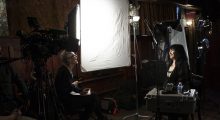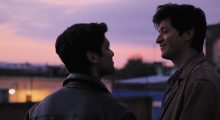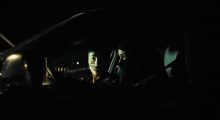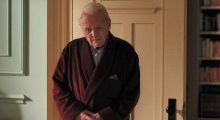Features
-
Battle Cry: Beth B and Lydia Lunch on Lydia Lunch: The War is Never Over

Beth B’s films take you deep into the darkness of the human psyche. With a body of work that includes shorts, features, video installations and episodic television, she creates from a place of pure opposition and resistance, standing up against oppressive systems of control and calling them out with the knowledge that discomfort and provocation are what creates dialogue and generates positive change. B’s films are not easy. B’s new documentary film, Lydia Lunch: The War Is Never Over, may be her most compelling and powerful film yet, as it looks at musician, writer and provocateur Lydia Lunch’s 45-year career […]
-
Pregnant Pauses: Matías Piñeiro on Isabella

Matías Piñeiro’s sixth feature and seventh Shakespeare-related film, Isabella, begins with purely abstract images whose use here is new in his work: four different shades on the blue spectrum, alternately lighter and darker in smaller and smaller concentric rectangles. The smallest, central rectangle fades to purple before three different shades of that color pulsate outward to the largest rectangle. The rectangles then dissolve into one unified purple that fills the rectangular frame containing the film itself, which starts gently pulsating in different shades under silent opening titles. These abstract color studies (whose resemblance to the work of James Turrell was […]
-
Love and Memories: Director Phil Lord Interviews Director Heidi Ewing About Her Debut Narrative Feature, I Carry You With Me

This article was originally published in Filmmaker‘s Spring, 2021 edition. It is being posted today online in conjunction with I Carry You With Me‘s release in theaters from Sony Pictures Classics. Arriving amidst a number of recent pictures exploring notions of hybridity—mostly documentaries that incorporate narrative or meta elements—nonfiction filmmaker Heidi Ewing’s feature dramatic debut, I Carry You With Me, deploys its formal invention in movingly unexpected ways. Taking the recounted memories of an undocumented Mexican couple living in New York, Ewing tells a swooning, deeply romantic period love story. And it’s one that achieves an arresting sobriety with contemporary […]
-
The Rocking Chair Interview: In Conversation with Ja’Tovia Gary

This article is co-published with Sentient.Art.Film, as part of their new monthly newsletter. The Sentient.Art.Film Bulletin is a community newsletter focused around fostering discourse around film exhibition infrastructures, art and cinema cultures, social change, and beyond. Subscribe to the bulletin here. Where to begin? I met Ja’Tovia Gary in Boston, Fall 2018; she was starting her Radcliffe–Harvard Film Study Center fellowship, and I my Ph.D. We were introduced by a mutual filmmaker friend, Theo Anthony, who I had met while living in Baltimore and Ja’Tovia knew from the Flaherty Seminar. The drone of this institution made us both feel strange […]
-
Conversations Between: Sky Hopinka and Theo Anthony Discuss maɬni – towards the ocean, towards the shore

There’s a moment in Sky Hopinka’s 2017 short film, Anti-Objects, or Space Without Path or Boundary, where for just a few frames, a layer of video floats on top of the subtitles. Blink and you’ll miss it, but in those frames something deeper winks back at you. Subtitles often float like oil on top of water; they are in the image but not of the image. But in Sky’s films, language is not a metatext. It’s organic, dynamic, always in the process of becoming something else. Language shapes and is shaped, carries and is carried, by the specificity of the […]
-
Mask Mandate: Writer/Director Tim Sutton on Funny Face

Every major city goes through extended periods of change. Since the turn of the century, New York City has been engaged in perhaps the most detestable metamorphosis. It’s increasingly become an unaffordable playground for wealthy elites, where longtime residents get bought out and relocated to satisfy greedy land developers’ dreams of additional luxury apartments. It’s in the brewing frustration (if not outright rage) of those displaced that New York–based writer-director Tim Sutton’s fifth feature, Funny Face, finds its inspiration. Set in Coney Island, Brooklyn, in the early months of 2019, the film follows Saul (Cosmo Jarvis), a socially awkward loner […]
-
Render Time: Director Penny Lane Talks with A Glitch in the Matrix Director Rodney Ascher about His Reality-Questioning Documentary

In 1977, a characteristically fervid Philip K. Dick arrived to lecture at a science fiction convention and share his experiences from three years earlier, when he became convinced that the world was a simulation, one of many (“there may be 30 or 3,000 of them”) operating simultaneously, glimpses of which he’d seen. Clips from this speech (“If You Find This World Bad, You Should See Some of the Others”) and the Q&A that followed frame Rodney Ascher’s A Glitch in the Matrix. In the five-chapter (plus an epilogue) dive into the world of “simulation theory,” Ascher focuses on five subjects […]
-
A Question of Empathy: Viktor Kossakovsky on Gunda

Born in what was then Leningrad, U.S.S.R., Viktor Kossakovsky embarked on his journey to become one of the world’s most celebrated and elemental nonfiction filmmakers with a love of photography and a desire to explore the complexities of Russian history. After taking on various below-the-line roles at the Leningrad Studio of Documentaries, Kossakovsky directed his first feature, Losev, a black-and-white portrait of the elderly Russian philosopher Aleksei Fedorovich Losev. For his next black-and-white film, The Belovs, Kossakovsky turned inward, documenting a spirited but warring brother and his sister living on a farm in a western Russian village he had visited […]
-
The Doors of Our Mind: Director Florian Zeller on Memory, Mystery and The Father

The following interview was originally published in Filmmaker‘s Winter, 2021 print edition. Among the techniques used to remember is one dating back to the Ancient Greeks: the Memory Palace. Facts, people, life events are “placed” within the rooms of a building, preferably a real one the remembering person is very familiar with. To summon the memories, the person mentally strolls from room to room, allowing the individual locations within the building to trigger the images placed inside. The Memory Palace’s ability to associate memories with place is given a devastating twist in French director Florian Zeller’s debut picture, The Father, […]
-
The Places Left Behind

Gianfranco Rosi’s nonfiction films are unified by their (often solo shooter) director’s precise framing. With images so strongly composed, the films’ status as vérité documentation has raised, if not controversy, at least questions about judgment, overaestheticization and potentially trivializing endangered subjects. That’s especially true of Rosi’s latest, Notturno, filmed over three years across the borders of Iraq, Kurdistan, Syria and Lebanon. From the opening shot, capturing with geometrical precision a group of soldiers running laps, Notturno elides names, battles and geographical precision into a group portrait of grief echoing across territorial demarcations. A site for war-scarred children in therapy, a […]
